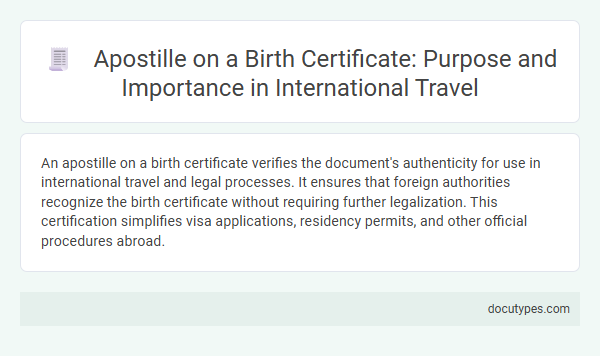An apostille on a birth certificate verifies the document's authenticity for use in international travel and legal processes. It ensures that foreign authorities recognize the birth certificate without requiring further legalization. This certification simplifies visa applications, residency permits, and other official procedures abroad.
Understanding Apostille: Definition and Overview
An apostille is a certified form of authentication issued to official documents, including birth certificates, for use in international travel and legal processes. It verifies the legitimacy of the document for acceptance in foreign countries that are part of the Hague Apostille Convention.
The purpose of an apostille on a birth certificate is to confirm its authenticity and ensure it is recognized by the authorities abroad. This eliminates the need for further legalization or notarization when traveling or conducting official business internationally.
Why Apostille Is Required for Birth Certificates
An apostille on a birth certificate verifies the document's authenticity for use in foreign countries participating in the Hague Apostille Convention. This certification ensures that your birth certificate is legally recognized by international authorities.
Birth certificates require an apostille when used for important processes such as obtaining visas, residency permits, or citizenship abroad. Without an apostille, foreign governments may reject your birth certificate as invalid or unverified.
Legal Importance of Apostille in International Travel
An apostille on a birth certificate verifies the document's authenticity for use in international travel and legal procedures. It ensures that foreign authorities recognize the birth certificate as genuine, preventing complications during visa applications or residency processes.
The legal importance of an apostille lies in its role as a standardized certification under the 1961 Hague Convention, which streamlines document verification across member countries. Without an apostille, a birth certificate may be rejected or require additional legalization steps, causing delays and increased costs. Travelers depend on the apostille to facilitate smooth processing of immigration, adoption, or citizenship claims abroad.
How Apostille Facilitates Cross-Border Mobility
| Aspect | Details |
|---|---|
| Purpose of Apostille | An apostille certifies the authenticity of a birth certificate, ensuring it is recognized by foreign governments under the Hague Apostille Convention. |
| Legal Validation | It verifies the signature, capacity, and seal of the issuing authority, preventing the need for further legalization in countries that accept apostilles. |
| Cross-Border Mobility | An apostille enables smooth processing of your birth certificate across international borders, facilitating visa applications, residency permits, and other travel-related documentation. |
| Time Efficiency | By providing a standardized form of authentication, an apostille reduces delays and administrative hurdles when presenting birth certificates abroad. |
| Acceptance Scope | This certification is recognized by over 120 countries, making it essential for international travelers requiring official proof of identity and citizenship. |
The Apostille Process for Birth Certificates Explained
An apostille on a birth certificate certifies the document's authenticity for use in international travel. This official certification enables foreign governments to recognize your birth certificate as valid and genuine.
- Document Verification - The birth certificate is first verified by the issuing authority or government office to confirm its legitimacy.
- Submission for Apostille - The verified birth certificate is submitted to the designated apostille authority, usually the Secretary of State or equivalent office.
- Apostille Issuance - The apostille authority attaches an official seal or certificate to the birth certificate, validating it for international use under the Hague Convention.
Recognized Countries Under The Hague Apostille Convention
An apostille on a birth certificate certifies the document's authenticity for international use, simplifying legal recognition in foreign countries. This process applies exclusively to countries recognized under The Hague Apostille Convention, ensuring seamless acceptance without further legalization. You need an apostille to confirm your birth certificate is valid and accepted when traveling to or conducting legal matters in these member nations.
Common International Scenarios Requiring Apostille
An apostille on a birth certificate certifies the document's authenticity for use in foreign countries that are members of the Hague Apostille Convention. This facilitates smooth processing of legal and official matters during international travel.
- Visa Applications - Many countries require an apostilled birth certificate to verify identity and family relationships during visa processing.
- Child Custody and Adoption - Apostilles ensure the birth certificate is recognized by international courts and authorities when handling custody or adoption across borders.
- Immigration Procedures - Immigration offices often request an apostille to confirm the validity of birth certificates when granting residency or citizenship abroad.
Consequences of Traveling Without an Apostilled Birth Certificate
What is the purpose of an apostille on a birth certificate for international travel? An apostille certifies the authenticity of your birth certificate, making it legally recognized in foreign countries that are part of the Hague Apostille Convention. Without an apostilled birth certificate, you may face delays, denied entry, or complications in verifying your identity abroad.
Step-by-Step Guide to Obtaining an Apostille on a Birth Certificate
An apostille on a birth certificate verifies the document's authenticity for use in international travel. This certification ensures that foreign authorities accept the birth certificate without further legalization.
- Locate the Issuing Authority - Identify the government office responsible for apostilles in your birth certificate's jurisdiction.
- Submit the Birth Certificate - Provide the original or certified copy of your birth certificate to the designated authority for review.
- Receive the Apostille - Obtain the apostille stamp or certificate attached to your birth certificate, confirming its legitimacy abroad.
Securing an apostille facilitates smoother international travel by validating your birth certificate for foreign officials.
What Is the Purpose of an Apostille on a Birth Certificate for International Travel? Infographic

